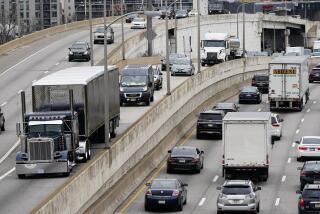Tougher Rules for Teen-Age Drivers Sought
- Share via
WASHINGTON — States should restrict night driving by teen-agers and toughen alcohol laws to reverse the growing incidence of traffic accidents involving young drivers, the federal agency responsible for promoting highway safety said Tuesday.
The National Transportation Safety Board, in a letter to be sent next week to all 50 governors, said that teen-agers have easy access to alcohol and are less experienced than older drivers and more prone to take risks behind the wheel.
“Younger drivers are overrepresented in traffic crashes and deaths,” the board said. The agency noted that people under 21 years of age make up 7.1% of all licensed drivers in the United States, but account for 15% of all driver fatalities.
In California, 1,004 drivers under 21 were killed in traffic accidents in 1991, the latest year for which nationwide statistics are available. That total was the highest in the nation, said Alan Pollock, a spokesman for the traffic safety agency.
“In the early 1980s, the board led the fight to raise the drinking age to 21,” Pollock said. “That happened and deaths went down. But since 1987, the figure has been creeping up again and the board decided to take another look at the problem.”
The NTSB estimates that a 1984 federal law requiring states to raise their legal drinking age to 21 or risk losing federal highway aid saved 12,000 lives. But loopholes and lax enforcement of alcohol laws led the agency to make additional recommendations on Tuesday, Pollock said.
Specifically, the agency said that states should enact curfews on night-time driving, especially between midnight and 5 a.m., by “young novice drivers” of 16 or 17. Pollock noted that New York bans driving by those under 18 after 9 p.m. While youths under 21 do about 20% of their driving at night, about 50% of the fatalities involving young drivers occur after dark.
In addition, states should adopt a “zero tolerance” policy for blood alcohol content in drivers under 21 years old. The laws should include the immediate loss of a driver’s license by any teen-agers found to have even trace amounts of alcohol in their systems. Adult limits range from 0.08% to 0.10% in most states.
States also should step up enforcement of minimum drinking age laws and dramatically increase the percentage of young drivers arrested for drunk driving. In addition, states should pass new laws that specifically make it a crime for a minor to misrepresent his or her age or present false identification at a liquor store.
Currently, 15 states, including California, set a lower blood alcohol level for minors, but only five states have set the level at zero.
“Lower blood alcohol content makes very good sense,” Brian O’Neill, president of the Insurance Institute for Highway Safety, told Reuters news agency. “You could argue for zero (blood alcohol content) since they shouldn’t be drinking at all.”
In addition to restricting night-time driving by teen-agers, the safety board said that states should create provisional licenses that would require one or two years of accident-free driving before a young driver could receive a permanent license.
“The board’s experience indicates that the most effective combination is tough, fair laws and vigorous enforcement combined with an intensive, targeted educational campaign,” Pollock said.
That enforcement should include stringent measures against liquor vendors who violate the law by selling to minors, the board said.
A study by the U.S. Public Health Service, for example, found that laws banning alcohol consumption by those under 21 have little effect because state laws are replete with “loopholes, laxity and lip service.”
Another study of teen-age drinking cited by the board indicated that 44% of male high school seniors and 28% of female high school seniors said that they had taken five or more drinks at a single sitting within the last month.
In general, California has done a good job of drafting laws to prevent alcohol abuse by teen-agers, said Barry M. Sweedler, director of the board’s Office of Safety Recommendations. “But the state needs to tune up its program with zero alcohol content and night-time driving restrictions,” Sweedler added.
Although California bars anyone under 21 from purchasing alcohol, it permits drivers under 18 to operate a motor vehicle if they have a blood alcohol content of less than 0.05%, the safety board said.
The board does not have the power to impose rules on teen-age drivers but its reports in the past have prompted state Legislatures and public interest groups to take action.
More to Read
Sign up for Essential California
The most important California stories and recommendations in your inbox every morning.
You may occasionally receive promotional content from the Los Angeles Times.













